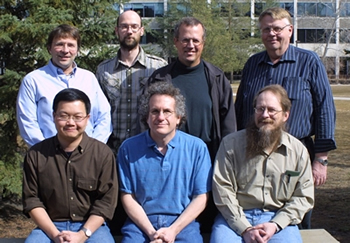Authors
Back: Yngvi Bjornsson, Neil Burch, Rob Lake, Joe Culberson
Front: Paul Lu, Jonathan Schaeffer, Steve Sutphen

Yngvi Bjornsson is an Associate Professor in the Department of Computer Science, Reykjavik University, Iceland. He received his Ph.D. from the University of Alberta in 2002. Yngvi’s major contribution to the project was with the Chinook endgame databases. His research interests include heuristic search in artificial intelligence.

Martin Bryant
martinbryant@colossus.demon.co.uk
Martin Bryant lives in the United Kingdom and is the author of the Colossus draughts program. He supplied Chinook with most of its opening book knowledge.

Neil Burch
burch@cs.ualberta.ca
Neil is a Senior Software Developer in the Department of Computing Science at the University of Alberta. He wrote the proof tree manager code for the checkers solver.

Joe Culberson
joe@cs.ualberta.ca
Joe Culberson is a Professor in the Department of Computing Science at the University of Alberta. He developed the first version of the endgame database code. His research interests include a mixture of theoretical analysis and experimental simulation of algorithms and data structures.

Akihiro Kishimoto
kishi@fun.ac.jp
Akihiro Kishimoto is an Assistant Professor in the Department of Media Architecture at Future University-Hakodate, Japan. He received his Ph.D. in 2005 from the University of Alberta. His major contribution to the checkers project was developing an efficient solution to the troubling graph-history interaction problem (with Martin Mueller). He was a co-author of ISshogi, which won the World Computer Shogi championships several times, and also works on search algorithms for computer Go.
Rob Lake is an Information Technology Planning and Forecasting Officer in the Office of the Provost and Vice President (Academic) at the University of Alberta in Edmonton, Alberta, Canada. During his Chinook days he worked as a Lead Research Systems Analyst in the Department of Computing Science. His involvement with Chinook was the construction of the 8-piece endgame database.

Paul Lu is an Associate Professor in the Department of Computing Science at the University of Alberta. His work with the Chinook project involved developing parallel search algorithms for Chinook and for endgame database construction. His research area is in parallel and distributed computing.

Martin Mueller
mmueller@cs.ualberta.ca
Martin Mueller is an Associate Professor in the Department of Computing Science at the University of Alberta. His major contribution to the checkers project was developing an efficient solution to the troubling graph-history interaction problem (with Akihiro Kishimoto). Martin’s research interests are centered on combinatorial game theory and developing new algorithms for computer Go programs.

Jonathan Schaeffer
jonathan@cs.ualberta.ca
Jonathan Schaeffer is a Professor in the Department of Computing Science at the University of Alberta. He is the leader of the checkers project, and he wrote most of the Chinook program. His research interests include parallel computing and artificial intelligence. He also works on poker-playing programs (this has been commercialized as Poker Academy).

Steve Sutphen
steve@cs.ualberta.ca
Steve Sutphen is a Faculty Service Officer in the Department of Computing Science at the University of Alberta. He leads the Research Planning and Advanced Development Group. Steve kept the hardware alive through 18 years of architecture changes.

Norman Treloar
Norman.Treloar@climatechange.qld.gov.au
Norman Treloar lives in Toowoomba, Australia and was our resident checkers expert. He was responsible for most of the checkers knowledge that has been incorporated in Chinook. Away from the checkerboard, Norm has studied the ozone depletion problem, and is now involved in modeling climate change and variability.

